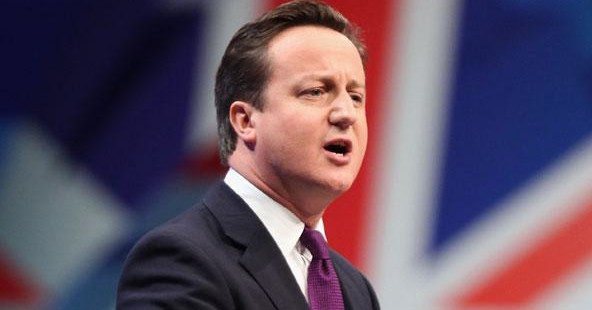
Cameron Rolls the Dice on Britain’s EU Future
Let there be no question about Britain. After Prime Minister David Cameron’s speech last week, there is a strong chance that the UK will abandon the European Union. Indeed, if a vote were held tomorrow Britons would choose by a considerable margin to leave.
Britain’s ties to Europe are now in trouble. Cameron has promised to hold a referendum EU membership by the end of 2017 if his Conservative Party is returned to power in elections due by 2015. The Tories got an immediate boost in the polls, so “A” to Cameron for tactical thinking.
But Cameron is leading Britain into a huge gamble. He wants the UK to remain in the union but on drastically renegotiated termshttp://latestnews.thefiscaltimes.com/2013/01/16/brussels-on-edge-ahead-o…. He is therefore counting on Germany and France to react to his promise of a referendum by offering more flexible terms for Britain’s continued membership. These terms would involve everything from environmental policy to taxes to regulations covering courts and policing. Cameron is asking the Continent to take a more free-market approach in all such questions. And this does not look likely.
The biggest consequences of the kind of change Cameron has now put on the table fall into three categories:
• Britain will remain America’s closest ally, but its global influence will be much reduced. It will drift toward the status of a marginal island nation, without the voice EU membership afforded it.
• Britain’s manufacturing sector is already in trouble, and it will fall further behind. The US has long been the No. 1 direct investor in Britain, in part because it is a gateway to the Continent’s markets. That will no longer be guaranteed; investment will shift to the Continent. (Note: Germany and France are also among the top five investors in UK manufacturing; this will alter, too.)
• The British economy will grow ever more dependent on financial serviceshttp://www.tuc.org.uk/economy/tuc-21327-f0.cfm. The imbalance between industry and finance is worse since the crisis of 2008. With independence, more traders—including Americans and other foreigners—will be drawn to London for its lighter regulatory hand. But this means the nation will effectively rest its fortunes on a sector that bears significant (need it be said?) systemic risk. “In practice, Britain is saying it doesn’t want a manufacturing sector,” says Marshall Auerback, a senior fellow at the Institute for New Economic Thinking. “This is its existential decision.”
• Finally, let us note the biggest non-consequence of Britain’s departure from the 27-member EU. The UK has long been identified as a force for liberal reform in the EU. This role is overstated. Britain’s calamitous economic policieshttp://www.guardian.co.uk/business/2013/jan/25/uk-triple-dip-recession-gdp, notably under the austerity-obsessed George Osborne, Cameron’s chancellor of the exchequer, have rendered the nation irrelevant within the EU. London’s defeats in the EU have already been many—most memorably, Cameron’s failed effort to freeze the EU budget last November—and in this respect Britain, were it eventually to withdraw, would be little missed.
Cameron was admirably honest on one point. At the bottom of this prolonged and worsening ruckus between the UK and Europe lies a deep philosophical divide that dates to the late-eighteenth century. On the one hand, we have Anglo–American liberalism, with its belief in individual freedom and the market; on the other we have Continental statism—the belief the individual is best realized within an organized and regulated society. You do not often get national leaders speaking bluntly on this topic. Here is Cameron last week:
“I know that the United Kingdom is sometimes seen as an argumentative and rather strong-minded member of the family of European nations. And it’s true that our geography has shaped our psychology. We have the character of an island nation—independent, forthright, passionate in defense of our sovereignty. We can no more change this British sensibility than we can drain the English Channel.”
OK, understood. But what do Cameron and his supporters want in practice? In general, London argues for “a new settlement”http://www.ft.com/cms/s/0/8812959a-6645-11e2-b967-00144feab49a.html#axzz… is, for the EU to throttle back and become once again a trading bloc more than a political entity. This means clawing back a lot of sovereignty that is now pre-empted by one or another of the EU’s voluminous regulations.
One area of longtime concern in London has been to curb the power of Brussels to regulate (or tax) financial transactions conducted in the City of London. That is still on the docket. But so are laws governing hiring and firing and work hours, environmental regulations, and laws governing the administration of justice. You get the idea: We will take this, Cameron is saying, but not that and not the other.
There is little chance of Cameron or any other British prime minister getting far with this menu. True, the leading nations of core Europe—France and Germany in particular—are eager to see the UK remain one of them. Germany likes Britain around to balance those hyper-statist French; the French like Britain around because the Germans tend to go too far in areas such as “green” policy.
But Europe has already signaledhttp://www.bbc.co.uk/news/world-europe-21140766that it will not accept British membership at any cost. They will especially resist Cameron’s “à la carte” approach to membership. “A policy of cherry-picking is not an option,” Guido Westerwelle, Germany’s foreign minister, said in response to Cameron’s speech. “We don’t need less but more integration.”
There is time left for London and Brussels to sort this out. And the Conservatives lag Labor in British polls, so Cameron may not even get re-elected: End of story.
But the British leader has acted very audaciously in waving an aroused, anti–European electorate in front of his EU partners. And his references to national character suggest that feelings run a lot deeper than policing policies on Blighty’s side of the English Channel.
“Maybe it’s right,” says Marshall Auerback. “Maybe it’s time to admit that Britain and the Continent have made an unworkable marriage.”

